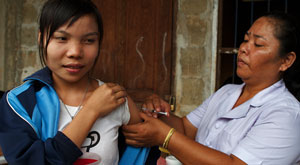Immunisation is a quick, simple and extremely effective way to save lives. AusAID's partnership with the GAVI Alliance (external website) is preventing millions of deaths through immunisation, and there have been some recent developments that will help to continue this great work.
What is GAVI?
GAVI is a public-private partnership, funded by donors like Australia, whose mission is to save children's lives and protect people's health by increasing access to immunisation in developing countries.
Since its establishment in 2000, GAVI has helped to immunise more than 326 million children and prevented more than 5.5 million premature deaths.
Australia's support is directly helping to immunise 7.7 million children against major diseases by 2015 through a $200 million commitment to GAVI.
GAVI a top performing partner
A recent assessment of Australia's 42 multilateral partners highlights GAVI as one of the top performers. The assessment found that GAVI has established a strong track record in delivering against its mandate to save children's lives and protect people's health by increasing access to immunisation in the world's poorest countries.
During a recent visit to Australia, GAVI Alliance CEO Dr Seth Berkley welcomed the findings and thanked AusAID for its leadership and support for immunisation. Read more in Seth Berkley's blog 'Thank you Australia, Thank you Australians'.
Two new vaccines to protect the children of Ghana
On 26 April 2012 Ghana made an unprecedented step towards saving the lives of its children from two of the biggest child killers in the country, through the simultaneous introduction of pneumococcal and rotavirus vaccines.
In Ghana, pneumonia and diarrhoea (a symptom of rotavirus) each cause approximately 10 per cent of under-five deaths and the vaccines will make a big difference in helping the country to reach Millennium Development Goal four.
With help from donors like Australia, the GAVI Alliance is making pneumococcal and rotavirus vaccines available to children in the developing world (video, external website).
Read more in the blog by Dan Thomas, Head of Media & Communications at the GAVI Alliance.
New support for vaccines against cervical cancer and rubella
In a global effort to protect more women from cervical cancer and millions of children from a premature death or life-long disabilities, the GAVI Alliance – with Australia's support – will include human papillomavirus (HPV) and combined measles-rubella vaccines in its portfolio for the first time as it opens a new round of applications for support to the world's poorest countries.
Highly transmissible, HPV causes approximately 275,000 cervical cancer deaths each year, of which more than 85 per cent occur in developing countries. Experts say this figure could increase to 430,000 by 2030 if action is not taken. Safe and effective HPV vaccines may prevent 70 per cent of cervical cancer cases. HPV also causes other, more rare, cancers in both men and women.
'Making it possible for children and women in developing countries to have the same access to these life-saving vaccines as their counterparts in richer nations is what GAVI was created to do,' said GAVI Alliance Board Chair Dagfinn HøybrÃ¥ten.
'By opening this new application round, we take another step towards our goal to avert close to four million future deaths by 2015 through immunisation. Ours is an investment that helps build healthy communities and accelerates development.'
More on vaccines against cervical cancer and rubella (external website)

